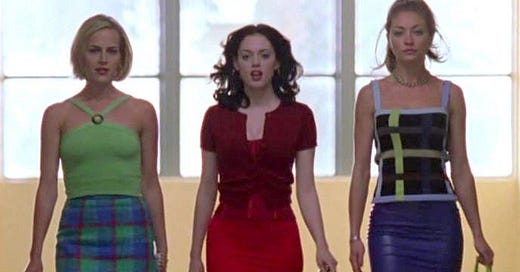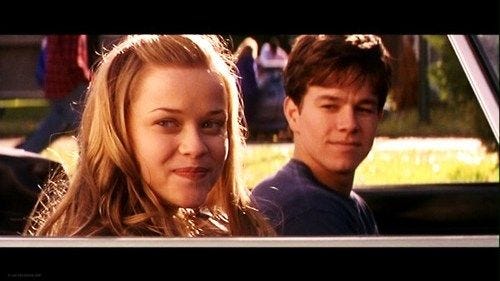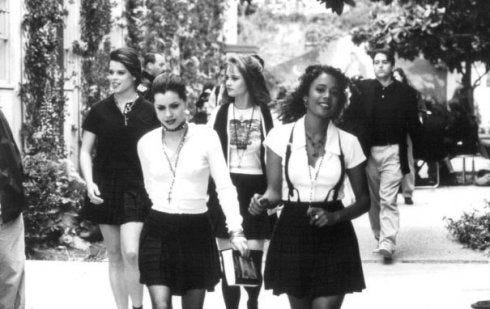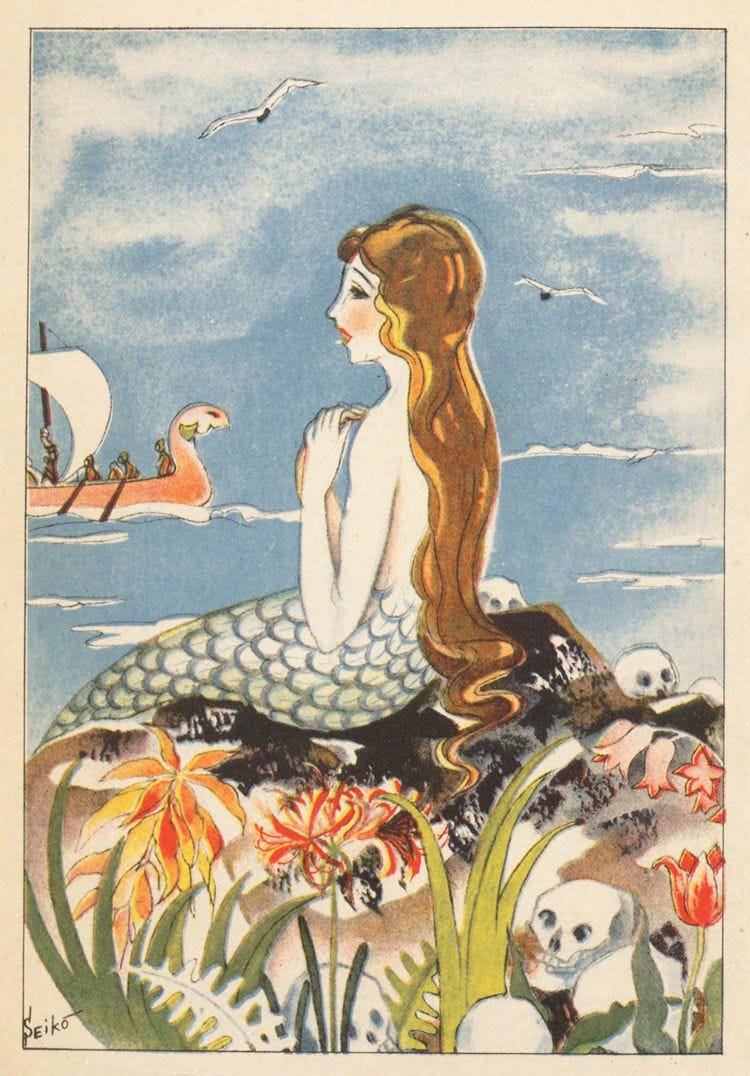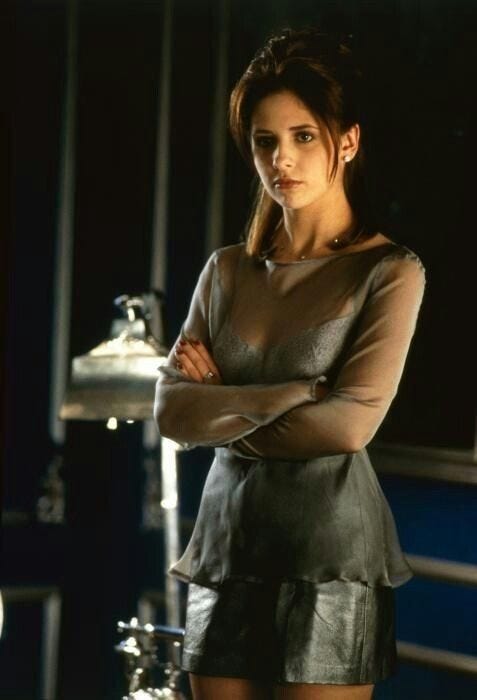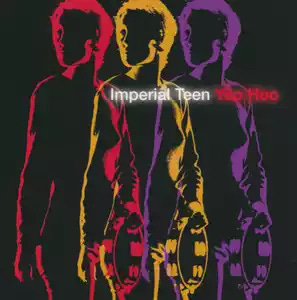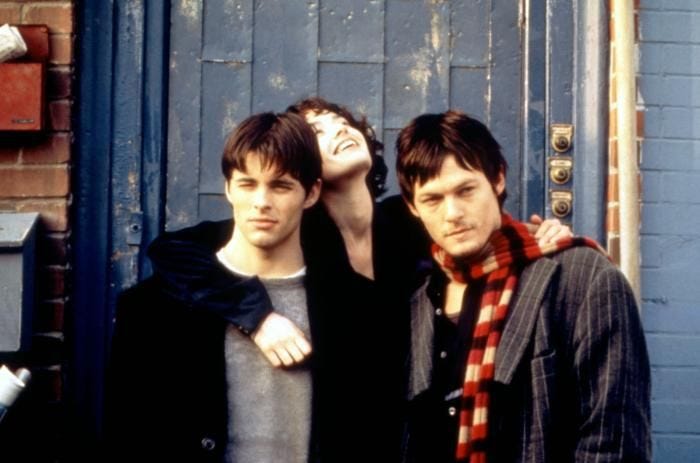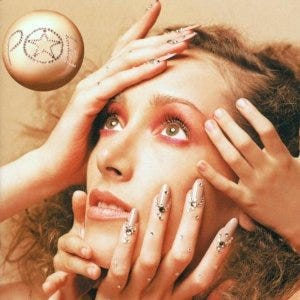The Women that Haunt Us: 90s Scream Queen's
The babes that ruled our screens and the soundtracks we couldn't live without
Nothing sets my heart aflutter like a 90's power ballad that cues up the leggy female leads. You know, the scene when the "genetically blessed" or "newly popular" (as the case in The Craft and Jawbreaker) line up at the end of the hall and captivate us with a mix of beauty and self-assured confidence. The eternal brand that only a teenage girl doused in CK ONE and platform wedges can provide.
As you can see, the 90's teen Scream Queens hold a special place in my heart.
I was contemplating the other day why these particular mega babes have stood the test of time for so many. Is it the biting one-liners? "I am Courtney Shayne. I don't believe we have met what with the cruel politics of high school and all."-Rose McGowan in Jawbreaker.
Maybe it's the nostalgia for a movie whose soundtrack is just as exciting and worthy of purchasing as the tickets to the film.
I have found that our beloved 90's Scream Queens typically fall under one of the five most universal feminine archetypes, originating over the years from anywhere from Greek mythology to fairytales. Some may argue that the concept of archetypes is "outdated," and they wouldn't be entirely wrong. Humans are complex beings and rarely fit neatly into an assigned category or a perfectly coiffed package. I'd argue the reason 90's Scream Queens have held the test of time is that even though they may be running from the killer/misogyny/themselves in a low-cut shirt, they tend to outsmart the bad guy or girl every time.
The Maiden
Often known as the "damsel in distress," the Maiden is said to possess an uncorrupted, "virginal" quality. Picture Sleeping Beauty but with a bit more resourcefulness. I know it's sexist as hell, but for as many ways as the '90s were great, they were equally disappointing, especially when it came to gender stereotypes, racisms, and social injustices.
The Scream Queen that first comes to mind for this archetype is Reese Witherspoon. Not only is her doe-eyed innocence a perfect canvas for all the shock and horror she is bound to experience at the hands of toxic masculinity, but she also starred in two of the most iconic films of the 90's Fear and Cruel Intentions.
Now you may be thinking, Cruel Intentions? That's not a horror movie. Is it not? Step-siblings scheming to deflower (multiple) young girls? I think in the wake of #metoo, it passes.
Don't get me wrong; I'm very much into the depraved inner workings within this movie's star-studded cast. Icky pseudo-sibling behavior holds up; ask V.C. Andrews. Cruel Intentions packs a punch, exploring less familiar horror movie dynamics such as star-crossed lovers, unrequited love, and everyone's vice of choice: lust. All wrapped up in a tawdry wrapper of mutual masturbation sessions and blackmail.
Now back to Reese. Typecasting is a bitch, but Reese benefited from her ability to convey shock and awe as only a well-trained ingenue can in both these films.
In Fear and Cruel Intentions, you could argue she falls for the wrong guy both times, but I have to disagree. Though Reese is lured in by both men's obvious charms (David's tight-fitting shirts and Sebastian's tongue-in-cheek humor), they vehemently pursue her (cue Bush's Machinehead). Reese's character adamantly and honorably distances herself from them both repeatedly. However, both David and Sebastian locate her with an almost bloodhound-like skill before social media was indeed a thing. I think my naive teenage mind considered these stalker-Esque gestures romantic? Regardless, David and Sebastian are helpless to her brand of I've-never-done-this-before and are moved (by their chemical imbalances) to behave rather poorly (to put it mildly).
This strong-willed aspect of the Maiden archetype is often overlooked. She is traditionally fawned over for her gentle and "pure of heart" persona. Reese occupies both of these elements as Nicole and Annette. Still, she is more steadfast in her convictions and more self-aware than even these men realize until inevitably, it is too late for both of them. Cue "Bitter Sweet Symphony" by the Verve with Reese behind Sebastian's Jaguar XK140 roadster, his private journal beside her, and golden locks fluttering in the wind.
I'd be remiss if I did not mention two of the more famous Maiden characters within this 90s scream queen era: Neve Campbell as Sydney Prescot in Scream and Jennifer Love Hewitt as Julie James in I Know What You Did Last Summer. Both roles involve similar character developments. The once timid, ill-fated innocence is eroded to reveal two badass chicks that refuse to take some damaged white guy's shit anymore. Everyone loves when the central character finally has enough and gives the bad guy (in this case) exactly what he deserves. Neve Campbell's character Sydney Prescot even becomes an almost Laurie Strode-like character from the Halloween franchise. An eternal survivor. Like so many archetypes, the point is that the Maiden is not always just what you see.
The Mystic
The mystic archetype usually possesses an otherworldly presence. Throughout history, she is portrayed as a woman on a journey, often searching for inner peace. The mystic is defined by inviting energy that draws people to them, like Robin Tunney's character Sarah Bailey in The Craft. Her soon-to-be "coven" spots her almost immediately. The "new girl" character always allows for a level of intrigue, but Sarah is exceptional, which is a credit to Tunney's skill. She has a history of portraying tenacious characters through a quiet calmness. The Craft was bound to be a cult classic because it unknowingly subscribed to the perfect recipe: dark arts, killer wardrobes, and a soundtrack that still hits.
Just kidding, there's much more to this teen horror masterpiece. First, there is the power of female friendships. You learn this secret early on as a young girl, but it's not often spoken about. There's a sort of electricity that can spark when the right group of women gets together—the kind of energy that can inspire real movement and change to take shape. You know, the kind that makes less evolved men nervous. This can materialize in many forms, but I think if most women looked back on their youth, they could pinpoint a few occasions when it seemed like some other world magic was sprinkled in. We watch this unfold on screen and eventually grow into a momentous roar that unleashes itself upon racists, rapists, and other scumbags. Sarah and the Coven are at the helm of this reckoning, like most things; it's fun until it's not so much anymore. Sarah is the guiding light, lost in many ways like the others, but she has the foresight to pull back and calibrate before them. This is why she is the ideal mystic archetype. Few soundtracks are as eclectic as The Craft's, too-everything from The Beatles, Letters To Cleo, to Spacehog. A good soundtrack resonates years later, but a great one brings you back to the exact scene the song played in. This is that soundtrack.
The Queen-The Siren
These are the primary archetypes that every strong-minded and alluring female lead in the '90s and early 2000s is etched in.
"The Queen" and "The Siren" are closely intertwined because they are routinely blamed for influencing a man's destructive tendencies (eye roll). Each female archetype is influential in their way, but historically The Queen and The Siren have been the most talk-about. Equally coveted and admonished for their feminine wills, they are often portrayed as possessing such a potent blend of sexuality; men and women are merely helpless victims in their cherry lipstick wake. Virtually every article that references "The Siren" details how Greek mythology exploits a narrative of these mythical "Sirens," luring sailors to their untimely demise against a wall of rocks. It sounds more like these sailors were distracted by a hot mermaid and could have benefitted from a compass.
The 90's Scream Queens that most clearly define this archetype: Courtney Shayne, played by Rose McGowan in Jawbreaker—"Satan in heels," as she's affectionately called. Kathryn Merteuil is the "bitch of the Upper West Side," played by Sarah Michelle Gellar in Cruel Intentions. These archetypes may have been more compelling to me than the average teen simply because my teenage existence was a far cry from these mega babes.
In the opening of Jawbreaker, Fern Mayo describes this high school phenomenon perfectly: "The beautiful ones, the flawless four. Everyone wanted to be them. You know them—they went to your school too. They ruled."
I'd often stare at the popular girls in the first period from under my ROXY hoodie and admire their full face of make-up and perfectly styled hair. It was 7:20 am, and most mornings, I could barely brush my teeth and push past my permanent state of melancholy. I think we all knew the type of girls Fern was describing. While most articles rush to not only exalt but to shame The Queen and Siren, I'm here to take an unpopular stance in that while they both exhibit poor judgment on their best days and borderline sociopathic tendencies on their worst, they exposed my generation to a new brand of female who not only embraced her sexuality but wasn't afraid to lead with it. Kathryn's character describes the dichotomy of portraying her outwardly socially accepted socialite persona versus her sex-positive "true self" in private.
"Eat me, Sebastian! It's okay for guys like you and Court to fuck everyone. But when I do it, I get dumped for innocent little twits like Cecile. God forbid I exude confidence and enjoy sex. Do you think I relish the fact that I have to act like Mary Sunshine 24/7 to be considered a lady? I'm the Marcia fucking Brady of the Upper East Side, and sometimes I want to kill myself." It was the first time I had heard someone identify the double standard so eloquently in a teen film (for the '90s), all the while dawning corseted La Perla and Prada slip dresses.
Courtney Shayne shared a more specific brand of kink behind closed doors. One of my favorite scenes is her coaxing a neanderthal football player to deep throat a popsicle as foreplay. Courtney was also less covert with her more toxic traits of anger and vengeful outbursts. She almost reveled in misbehaving openly (having a penchant for slamming girls against lockers and bathroom mirrors), all the while wearing pastels and fitted sweaters reminiscent of a 50's movie star. Both bombshells wielded their sexuality with an almost nuclear force, and what it showed me is that you have more than a few weapons in your arsenal as a woman. I know it's not the appropriate 2021 or sweet after-school special message you'd hope for, but this is why I root for the Queen and the Siren. They appeal to my competitive nature, and if society wants to vilify overt sexuality, they have to stop playing by old rules. But alas, both Courtney and Kathryn were not spared when confronting their demons (ultimately themselves).
The Verve and the Imperials offer the kind of perfect music scene marriage that has us all thinking of rosary coke necklaces and neon pencil skirts moving perfectly in synch down a freshly Lysoled high school floor.
The Lover
Lena Headey's creatively-charged character, Cathy Jones in Gossip, is the epitome of "The Lover" archetype. Playful, confident, and self-assured, The Lover usually is someone you look up to. For me, it was my best friend's older sister who embodied everything my teenage heart secretly longed to be. She was studious and beautiful and utterly unaware of it. An independent and free thinker, Lena's character Cathy delicately skims the periphery of traditional "cool" while still catching the most popular boy's (James Marsden's) eye.
If you aren't familiar with Gossip, I suggest you dedicate 93 minutes to this late 90's treasure. Technically I am bending the rules with Gossip. Its release was April 2000, but it was produced and filmed within the late 90's so I'm allowing it. The storyline not only eerily holds up, but the call sheet reads like a 90's wet dream: Kate Hudson, Joshua Jackson, Noorman Reedus, to name a few.
Cathy's character is an essential departure from the traditional "Maiden" or "Siren" character we saw reincarnated throughout the '90s. Cathy is equally brilliant as she is unconventionally beautiful. Maybe it's her messy French bob and penchant for hard-hitting journalism, but she is entrancing to watch. "I'm a girl with a problem. It's not like I don't know better. But I seem to have gotten myself involved in a very tempting situation," Cathy Jones explains as she narrates the opening credits.
Cathy's character is one of the more easily relatable archetypes in that she often knows better but makes missteps simply because she is human. If you find yourself yelling at the screen when she and James Marsden's character Derrick find themselves intertwined on the kitchen counter, let's all remember that we've all most likely fallen for a manipulative, good-looking human after too much whiskey.
I've always been drawn to the smartest girl in the room, and that's why Cathy's archetype deserves a place on this list. This Scream Queen will pull you in, and not only will you go willingly but also the music by Poe and Tonic will ease you into this films' twisted game of telephone.
